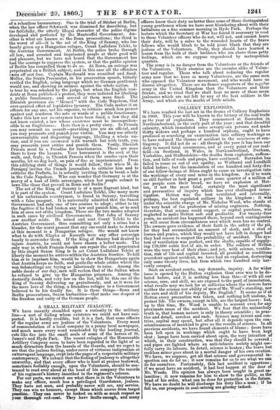COLLIERY EXPLOSIONS.
WE have reached the last act in the drama of Colliery Explosions in 1860. This year will be known in the history of the coal trade as the year of explosions. They commenced at Burradon- in Northumberland, in the early part of the year ; and that dreadfiil calamity, which immolated some seventy-six persons and made • thifty widows and perhaps a hundred orphans, ought to have produced so searching an examination into Colliery workings as to have reduced the chance of accident to the minimum of con- tingency. It did not do so : all through the year it has been our duty to record fatal occurrences, and at every point of our ooal- field—in Scotland, in Wales, in Northumberland, Durham, Yorkshire, and Staffordshire—the deaths from explosion, suffoca- tion, and falls of roofs and props, have continued. Burradon has failed to rouse us out of our apathy, as Wallsend and Luildhill failed before ; but the immolation of one hundred and forty-five of our fellow-beings at Risoa ought to cause an investigation into the workings of every coal mine in the kingdom. As if to wain - us still further in how great a peril some quarter of a million of our people earn their bread, we have an explosion at Het- ton, if not the most fatal, certainly the most significant and provocative of inquiry which has ever challenged inves- tigation. Hetton was the best ventilated and internally, ' perhaps, the best regulated colliery in the kingdom ; it was under the scientific charge of Mr. Nicholas Wood, who stands at the Iery head of the profession of mining engineers. Nothittg, therefore, that science could suggest, or capital purchase, was neglected to make Hetton safe and profitable. For twenty-four years no accident has happened there, beyond such contingencies as will occur from circumstances over which man has no control. The owners gave evidence of their faith in the safety of the pit, for they had accumulated an_amount of stock, and a stud of horses and ponies, which they would not have left in danger had they had reason to suspect the probability of accident. The Sys- tern of ventilation was perfect, and the shafts, capable of supply- ing 170,000 cubic feet of air, in order. The colliers of Hetton were the very best of their class ; and yet, with science, ventila- tion risk of life and capital invested, all provided as conditions
precedent against accident, we have had an explosion, destroying only some twenty lives, but from which two hundred only nar- rowly escaped.
Such an accident courts, nay demands, inquiry. A far wider issue is opened by the Hetton explosion than ever was to be de- bated before, and it is nothing less than this—if with all our science, care, and skill, we are exposed to the peril of immolation, what results may we look for at collieries where the viewers have neither the science nor ability of men of Mr. Wood's standing, nor the care and skill of his deputy, Mr. Daglish ? It seems as if at Hetton every precaution was taken, and nothing left undone, to protect life. The owners, except in life, are the largest losers : but, up to this time, Mr. Wood 18 unable to account even for any proximate cause of the accident. We fear that the melancholy truth is, that human nature is only in theory scientific ; in prac- tice and detail, careless and rash. Science may invent and con-
•
trive, capital may spend, but after all it depends upon the con- scientiousness of mankind to give us the results of science. In all previous accidents, we have found elements of blame ; doors have been left open in workings which ought to have been kept shut ; lamps have been carried about open, the very intention of which, in their construction, was that they should be covered ; and pipes are lighted where an anti-tobacco society might use- fully carry its labours. In detail, science is beaten ; the brave but reckless miner goes about in a mortal danger of his own creation. We have, we suppose, got all that science and governmental in- spection can do for us ; it now remains for us to see what we can do for ourselves. Fortunately, this last accident is opportune ; if we must have an accident, it had best happen at the door of Mr. Woods. His opinion has always been sought in great ca- . lamities ; it now remains for him to show to the public, as the head of his order, what can be done for protection in the future. We have no doubt he will discharge his duty like a man ; if he fail us, our prospects in coal-mining are gloomy indeed.


























 Previous page
Previous page